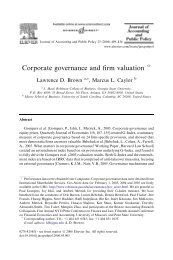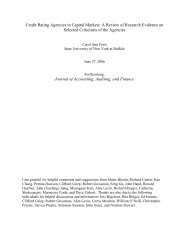Income Dynamics, Economic Rents and the Financialization of the ...
Income Dynamics, Economic Rents and the Financialization of the ...
Income Dynamics, Economic Rents and the Financialization of the ...
Create successful ePaper yourself
Turn your PDF publications into a flip-book with our unique Google optimized e-Paper software.
maskovic-Devey <strong>and</strong> McKinley 1981). The rise <strong>of</strong> institutional investors, both private (e.g.<br />
pension funds) <strong>and</strong> public (e.g. countries running budget surpluses such as Japan in <strong>the</strong> 1980s<br />
<strong>and</strong> China more recently) provided a steady source <strong>of</strong> investment capital to promoted continued<br />
financialization (Orhangazi 2008).<br />
At <strong>the</strong> same time <strong>the</strong> rise <strong>of</strong> <strong>the</strong> finance conception <strong>of</strong> <strong>the</strong> firm as a bundle <strong>of</strong> tradable as-<br />
sets, replaced managerial commitments to investment <strong>and</strong> innovation in specific markets (Fligs-<br />
tein 2001, Davis 2009). This produced a fundamental change in managerial behavior so that<br />
finance oriented managers came to control major corporations <strong>and</strong> short-term planning to in-<br />
crease stock price became <strong>the</strong> primary managerial focus. This shift to a shareholder value con-<br />
ception <strong>of</strong> <strong>the</strong> firm was reinforced by <strong>the</strong> linking <strong>of</strong> top management pay to stock options ra<strong>the</strong>r<br />
than long term market share, sales, or production based pr<strong>of</strong>it. <strong>Financialization</strong>, <strong>and</strong> particularly<br />
<strong>the</strong> rise in long term real interest rates, also encouraged managers to invest in financial instru-<br />
ments ra<strong>the</strong>r than in production.<br />
The financialization <strong>of</strong> <strong>the</strong> economy both allowed <strong>and</strong> encouraged financial speculation.<br />
While blaming <strong>the</strong> recent financial crisis simply on speculation (e.g. Schiller 2008) misses <strong>the</strong><br />
facilitating institutional organization <strong>of</strong> <strong>the</strong> economy, <strong>the</strong> post 1980 period is remarkable for a<br />
series <strong>of</strong> financial bubbles driven by speculative herding behavior among investors including <strong>the</strong><br />
early 1980s international debt crisis, <strong>the</strong> real estate bubble <strong>and</strong> savings <strong>and</strong> loan crisis <strong>of</strong> <strong>the</strong> mid-<br />
1980s, <strong>the</strong> stock market run-up <strong>and</strong> collapse <strong>of</strong> <strong>the</strong> late 1980s, <strong>the</strong> dot-com bubble <strong>of</strong> <strong>the</strong> late<br />
1990s, <strong>the</strong> hedge fund expansion in <strong>the</strong> late 1990s, <strong>and</strong> <strong>the</strong> real estate <strong>and</strong> stock market bubbles<br />
<strong>of</strong> <strong>the</strong> 2000s.<br />
Similarly, financialization has encouraged corporate leaders to switch <strong>the</strong>ir investment<br />
strategies from long to short term <strong>and</strong> from physical to financial investments. The increased fi-<br />
22







